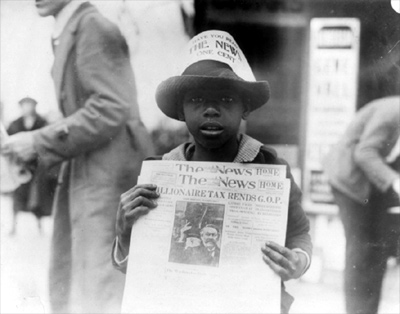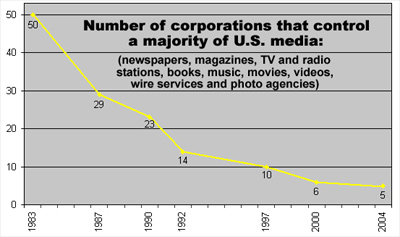Ac. Krtashivananda
 The primary function of the media is now to sell – sell audiences to corporate advertisers. The media make no money from subscriptions, only from advertisers, whose point of view they must reflect. Advertisers will not pay for discussions that encourage people to undermine corporate power.
The primary function of the media is now to sell – sell audiences to corporate advertisers. The media make no money from subscriptions, only from advertisers, whose point of view they must reflect. Advertisers will not pay for discussions that encourage people to undermine corporate power.
Media support of corporate power seemingly implies that the media sell free market principles. In reality, like the corporations they rely on, the media believe in free market principles only for others, not for themselves. Major corporations in every industrialized society rely heavily on state subsidies, intervention and investment. They will tell others to join the free market, but not join it themselves.
Take for example Corporate-Pentagon relations show just how dependent U.S. corporations are on government financing. The Pentagon is the massive core of a welfare state for the rich. It pours public funds in the guise of national security into advanced industry in every large sector of the economy.
Corporate-Pentagon relations are so close that discussing the U.S. as a market society without considering the Pentagon is like talking about the former U.S.S.R. and ignoring the Politburo. The media, which are controlled by corporate power, protect such policies.
Thought control
 Another characteristic of the media is thought control, or what can be called psycho-economic exploitation. In a totalitarian state, to compare, the state typically has the equivalent of a Ministry of Truth. Whatever the state publicises people have to accept. In liberal democracy, there is no Ministry of Truth but a consensus among extremely narrow sectors of power about the way the world should be perceived and about what kinds of people and policies should be encouraged. In other words, though there is freedom of expression, the media constantly manipulate freedom of thought.
Another characteristic of the media is thought control, or what can be called psycho-economic exploitation. In a totalitarian state, to compare, the state typically has the equivalent of a Ministry of Truth. Whatever the state publicises people have to accept. In liberal democracy, there is no Ministry of Truth but a consensus among extremely narrow sectors of power about the way the world should be perceived and about what kinds of people and policies should be encouraged. In other words, though there is freedom of expression, the media constantly manipulate freedom of thought.
As a result the real spectrum of opinion in the media in any industrialised country is quite narrow.
Take, for example, The public opposes increasing the Pentagon budget by a ratio of six to one, but it is still increasing. Another example is the policy of Globalisation. It is well documented that 20% of top echelon of the society enjoys 85% of the world income and bottom 20% only 1.5%.(hdr 2009) Still it is heralded as economic progress.
In a business-run society, those who spend a couple billion dollars on public relations want to know how to package things to overcome public opposition. Public attitudes are often quite divorced from ruling class opinion – often wildly at variance.
In reality people who run the media have no concern for democracy or freedom. They are more concerned about protecting power from people.
The Case For Challenging Corporate Journalism
Media Lens – edited by Ac. Krtashivananda
 The meaning of ‘corporate journalist’ could hardly be clearer: it describes someone paid to write for a corporation. Journalists working for the corporate media are choosing to work for just such an employer guided by the same cold-blooded priorities. So what should our reaction be?
The meaning of ‘corporate journalist’ could hardly be clearer: it describes someone paid to write for a corporation. Journalists working for the corporate media are choosing to work for just such an employer guided by the same cold-blooded priorities. So what should our reaction be?
Well how would we have responded to a journalist taking big salaries from Pravda in Stalinist Russia or from Der Stürmer in Nazi Germany during the 1930s? The question might seem outrageous, but is a global psychopathic corporate system more or less destructive than a national Stalinist or fascist system?
Part of the difficulty in considering the question rationally lies in the very nature of the problem being addressed. The corporate media are as skilled at promoting their non-existent virtues as they are at marginalising critics. They also have an astonishing ability to make even the most appalling state crimes (‘mistakes’) seem somehow trivial, unimportant, ‘not that bad’. So the very deceptiveness of the system makes the comparison with totalitarian media seem far more outrageous than it really is.
In fact the question is reasonable. If we look around us today – at the devastating Western wars of aggression, at the mass killings fuelled by corporate militarism, at the truly awesome, perhaps terminal, exploitation of people and planet – we are looking at a world being devastated by psychopathic greed. Former New York Times journalist, Chris Hedges, comments of ‘the liberal class’, the ‘quality’ corporate media included:
 ‘The liberal class has become a useless and despised appendage of corporate power… as [it] pollutes and poisons the ecosystem and propels us into a world where there will be only masters and serfs.’ (Hedges, Death Of The Liberal Class, Nation Books, 2011, p.12)
‘The liberal class has become a useless and despised appendage of corporate power… as [it] pollutes and poisons the ecosystem and propels us into a world where there will be only masters and serfs.’ (Hedges, Death Of The Liberal Class, Nation Books, 2011, p.12)
Noam Chomsky can answer about independent media, as can Edward Herman. Their book, Manufacturing Consent, published 25 years ago this year, is the most rational analysis of structural media bias we have seen. Both authors are still alive, Chomsky is a ground-breaking linguist and one of the world’s most-read political analysts. And yet the book has been ignored by the great and the good of corporate journalism. It has been mentioned eight times in the last five years in all national UK newspapers, all of them mentions in passing (one or two sentences) with zero serious analysis of the contents.
Despite a quarter of a century of growing, now undeniable, evidence of looming climate catastrophe, media coverage is a fraction of what it was when we, for example, began campaigning in the late 1980s. The last decade, in particular, has seen green movements more or less routed on climate change by corporate interests, with the media very much leading the assault. The argument that progressives should continue placating these media, supporting corporate leftists, and not declaring obvious truth, is more vulnerable now than it has ever been.
Trying To Move A Ten-Ton Truck With A Toothpick
Twitter is chock full of journalists praising their colleagues, editors, potential allies and future employers, with points also scored for lambasting recognised ‘bad guys’ like Chomsky, Julian Assange and Hugo Chavez. As Chomsky has noted, the political classes are ‘the masters of self-adulation’. It hardly needs us to point out that broadcast and print journalists are often feted as national treasures.
As Chomsky once wrote to Media Lens:
‘Am really impressed with what you are doing, though it’s like trying to move a ten-ton truck with a toothpick. They’re not going to allow themselves to be exposed.’
In the face of the disaster that has overtaken Iraq in the ten years since the 2003 invasion, a number of journalists have quietly lamented their own performance. The BBC’s political editor Nick Robinson writes in his book Live From Downing Street:
‘The build-up to the invasion of Iraq is the point in my career when I have most regretted not pushing harder and not asking more questions.’ (Robinson, Live from Downing Street, Transworld, 2012,p.332)
But the fact is that even the most cynical, hard-right media propagandists complicit in this horrendous crime have not paid any kind of price – they continue, unaffected, with their lucrative, high-profile careers. This facilitation of the killing of hundreds of thousands of innocent civilians abroad is a function of the media’s power without responsibility.
Conclusion
 In an attempt to break the spell and challenge the silence, we (Media Lens) do deliberately use provocative language. We believe the media is far more toxic than most people imagine. From our perspective, the truth about the corporate media’s mass deception can only be communicated honestly by language that many media consumers will find outrageous.
In an attempt to break the spell and challenge the silence, we (Media Lens) do deliberately use provocative language. We believe the media is far more toxic than most people imagine. From our perspective, the truth about the corporate media’s mass deception can only be communicated honestly by language that many media consumers will find outrageous.
If nothing else, we are a rare voice. Most political commentators dream of a contracted, regular column in the Guardian or Independent, of becoming a TV ‘name’. We have watched as younger writers on the left – some of them enthusiastic contributors to our message board – have carefully tailored their words and tone to achieve corporate media inclusion. The moment inclusion becomes possible or actual, they stop posting on our site, stop mentioning our work, and join the shaking mainstream heads denouncing us as ‘irresponsible’ and ‘extreme’. Unlike so many commentators, we really do have nothing to lose.
This does not make us saints, or even right. But it does challenge the claim that we – tragicomically charging the media’s ten-ton truck with a toothpick – are doing more harm than good.
